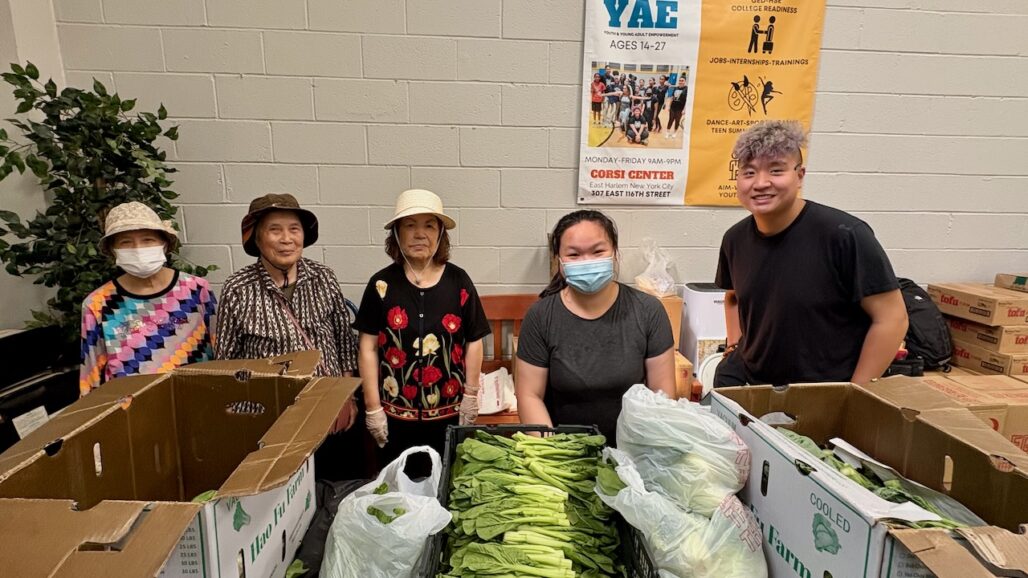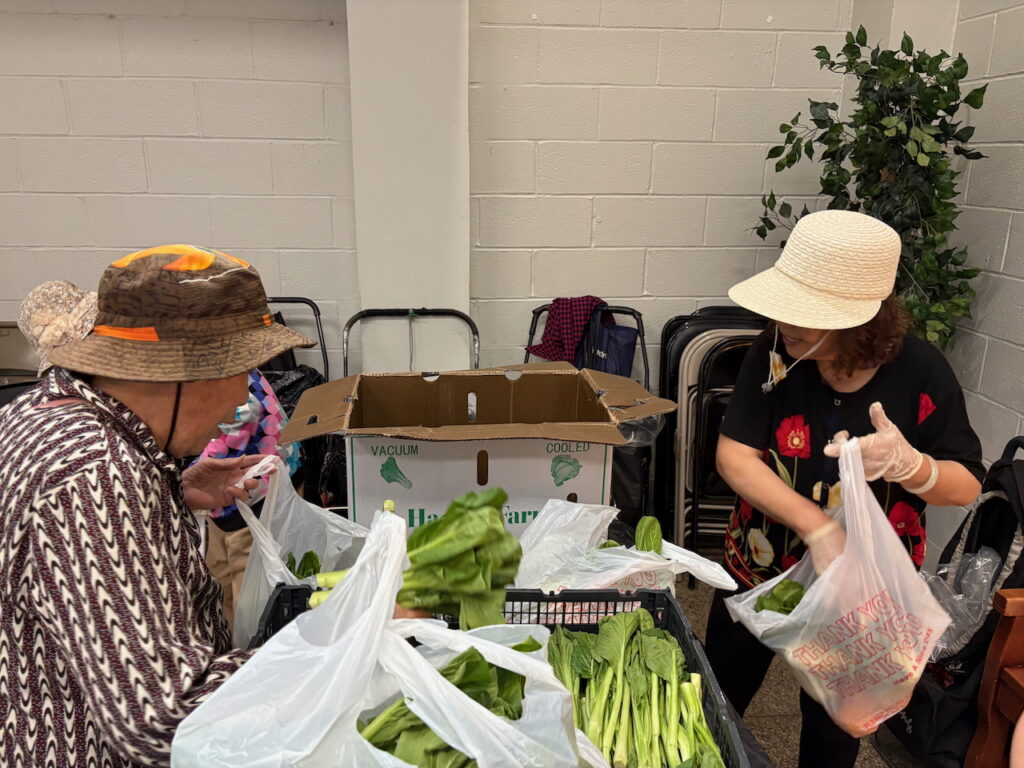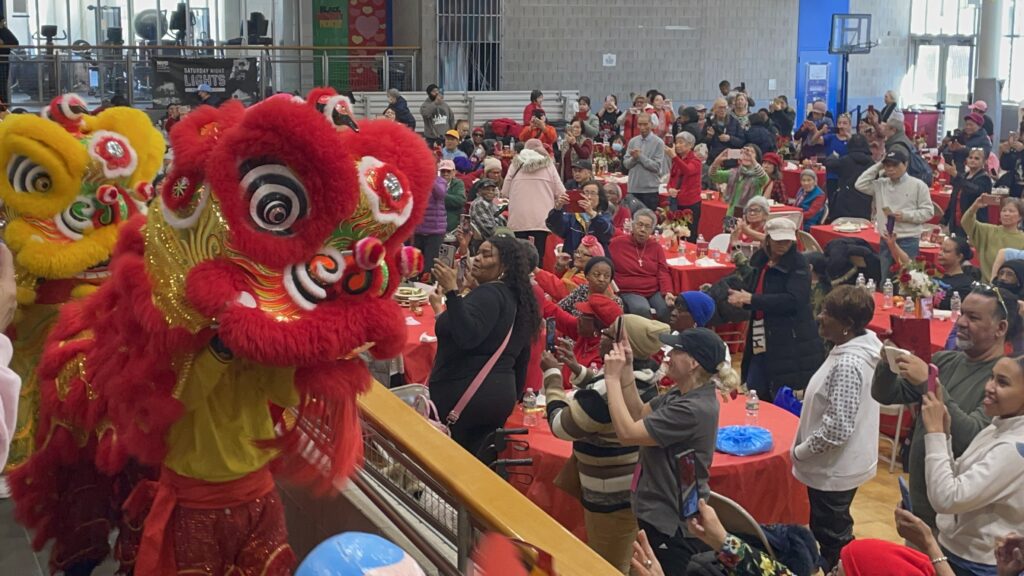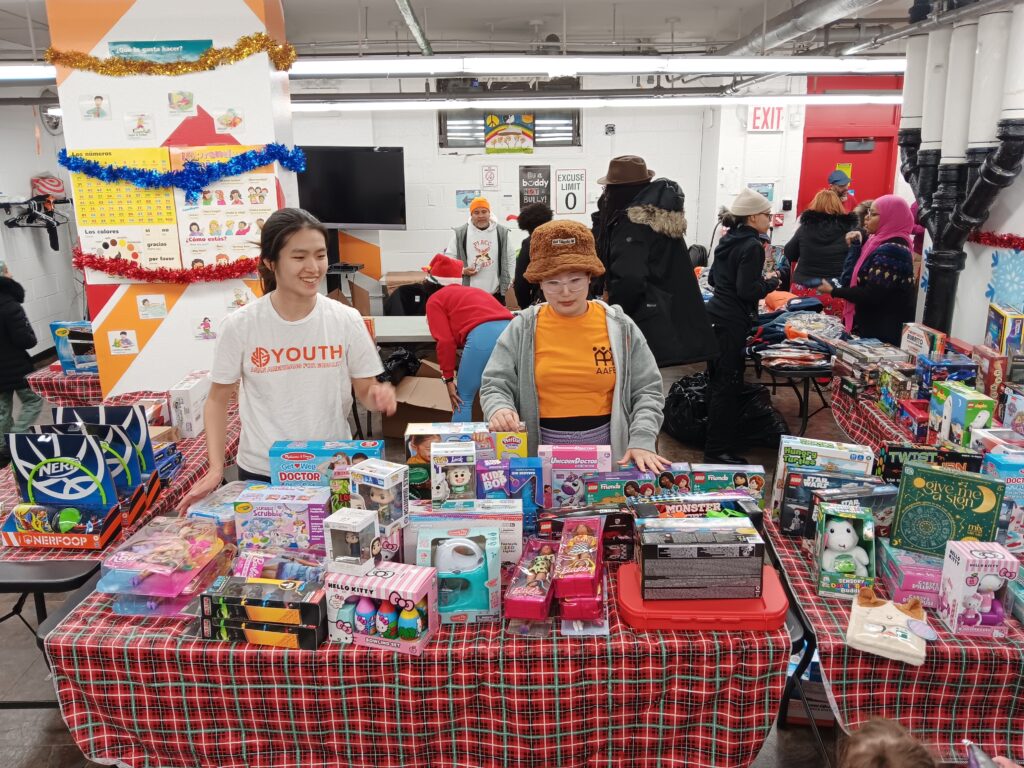Photo caption: AAFE’s East Harlem food pantry; (L-R) Ms. Li, Ms. Chen, Ms. Yang (volunteers), Poling Lau, Ling Ren (AAFE Staff).
For more than four years, Asian Americans for Equality has been expanding its presence in East Harlem, providing services to the growing number of Asian American residents in the community, alleviating the lack of culturally appropriate food and helping AAPI older adults to participate more fully in civic life. Not long ago, we visited AAFE’s monthly food pantry to talk with volunteers and our team members to learn more about the impact of AAFE’s programs and services for the local community.
When we arrived one recent morning at Union Settlement’s Corsi Center, on 116th Street, where the pantry is hosted, Ms. Yang and Ms. Li were busy unpacking fresh produce and other food items, creating individual grocery bags for each of the 120 pantry recipients, some of whom had already begun lining up for the 1 p.m. distribution. They are both volunteers, but also pantry recipients and, like about two-thirds of the community members AAFE serves in East Harlem, they are former residents of Manhattan’s Chintown.
During a break from the day’s volunteer duties, both women talked about the circumstances that brought them uptown and how AAFE’s programs and services are helping them feel more connected and secure in the community. Ms. Yang and her family moved from Chinatown in 2007, after finding an apartment in a public housing complex in East Harlem. Along with her husband and two sons, she previously lived in a cramped walkup on Allen Street, and knew they could not afford a larger home in the neighborhood. For years since relocating, Ms. Yang has made weekly trips back to Chinatown, 45 minutes each way on the train, to buy culturally appropriate groceries, unavailable in East Harlem stores.
AAFE started up the East Harlem pantry during the pandemic, a time when hate crimes targeting the AAPI community were on the rise, and there was a lot of fear about using public transit and traveling far from home. Ms. Yang still goes to Chinatown, but the monthly pantry distribution makes a difference in her household, especially as food costs continue to spiral upward. “I get fresh produce, vegetables and fruit, sometimes poultry and, during the holidays, specialty items,” Ms. Yang explains. But the pantry isn’t just a source of food. “I come here once a month,” she says. “I arrive at 10:30 in the morning and feel happier getting out of the home, instead of just being home watching TV, seeing friends and helping out the community.”
Ms. Li has lived in East Harlem with her husband since 2009 and, like Ms. Yang, relocated from Chinatown for more affordable rent. She also goes back to Chinatown frequently to shop and spend time with old friends. Ms. Li is a recipient of AAFE’s food distribution, as well as pantries offered by other community organizations. Together, they help relieve the economic burden in her household. AAFE’s pantry as well as counseling services connecting the family with essential government entitlement programs make a big difference to Ms. Li. “It’s great,” she says. “It’s been really helpful to have AAFE in the neighborhood to improve access to services.”
Among other initiatives, AAFE organizes and co-sponsors several annual events in East Harlem, including a Lunar New Year celebration and a Christmas toy giveaway. While people of Asian descent now make up nearly 10% of the East Harlem community, AAPI older adults are often isolated from their neighbors. Through our volunteer opportunities and public events, a big priority for AAFE is creating new opportunities for engagement with the broader community.
AAFE Program Manager Ling Ren, who oversees our East Harlem services, says, “These events are really meant to help address a huge problem our seniors face, you know, being siloed in their apartments, having little social interaction with others. So even when they’re standing in line for the pantry, they get to know their neighbors and then, many times, they’re motivated to get more involved in the community.”
A key AAFE partner in the neighborhood is local City Council member Diana Ayala, who co-sponsors our public events, supports the monthly pantry and hosts AAFE in her district office twice every week. AAFE’s Poling Lau works with constituents to help address many issues, providing multilingual access (in Mandarin and Cantonese) to government assistance and other programs. “I provide assistance in applying for Medicare and Medicaid,” says Lau. “I help with SNAP benefits, housing issues, rental assistance, finding senior housing. Also, tech support; a lot more people need help dealing with their cell phones. And one big issue we’re dealing with is that a lot of seniors’ food stamps have been stolen. ”
Including AAFE, there are only two or three places for local residents to turn for help with Chinese language social services. The demand is high. “Usually,” says Lau, “people are waiting back-to-back in the Council member’s office” to receive assistance. Five days a week, she offers one-on-one help, both face-to-face and via telephone. Lau has been with AAFE for a couple of years and has worked in the neighborhood as a social services provider for around 7 years. She believes the AAPI community is slowly becoming more engaged, even though it’s a long-term process. “When you build that foundation of, ‘Oh there’s someone there who speaks my language’,” she says, it establishes trust. Then they can build their own social circle, and they start participating and being part of the community.”




